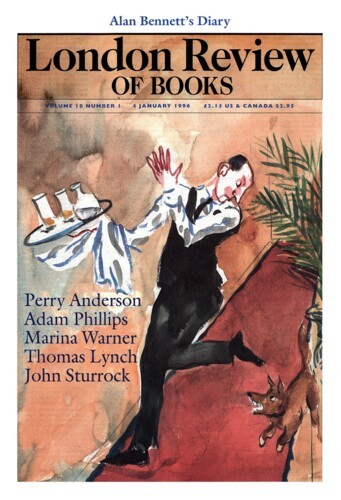Adam Phillips
Adam Phillips’s The Cure for Psychoanalysis and On Getting Better have just been published.
Podcasts & Videos
Tantrums
Adam Phillips
Adam Phillips reads an extract from his essay on tantrums.
Adam Phillips and Devorah Baum: Attention Seeking
Adam Phillips
Adam Phillips talks to Devorah Baum about his latest book, 'Attention Seeking', which argues, among other things, that attention seeking is the best thing we do.
Against Self-Criticism
Adam Phillips
Adam Philips reflects on the ways we hate ourselves, in his 2015 LRB Winter Lecture.
Adam Phillips: ‘Unforbidden Pleasures’
Adam Phillips
Adam Phillips talks about his new book Unforbidden Pleasures to psychotherapist Chris Oakley.
Pieces about Adam Phillips in the LRB
There is no cure: Freud’s Guesswork
Michael Wood, 6 July 2006
In 1936 Freud wrote a letter to Romain Rolland, offering him a speculation about a particular memory as a 70th birthday gift. The memory concerned a trip Freud took to Athens with his brother,...
Haunted by Kindnesses: The Project of Sanity
Michael Wood, 21 April 2005
‘It is, and is not,’ Ezra Pound wrote in a short poem called ‘Sub Mare’, ‘I am sane enough.’ What ‘is, and is not’ is the eerie landscape of the...
I must be mad: Wild Analysis
Nicholas Spice, 8 January 2004
‘What on earth would possess you to do that?’ This, more or less, is the question anyone who hasn’t ever been in analysis asks of those who have.
Complicated Detours: Darwin’s Worms by Adam Phillips
Frank Kermode, 11 November 1999
William Sherlock’s Practical Discourse concerning Death, published in 1689 and known familiarly as Sherlock on Death, was a bestseller in its day and long after. Dr Johnson commended...
Finding Words
Stanley Cavell, 20 February 1997
Early in his lovely and useful book on D.W. Winnicott, published in 1988, Adam Phillips gives a sketch of certain aims and fates of that increasingly treasured figure of British psychoanalysis...
The Conversation
D.J. Enright, 25 March 1993
This collection of essays by the psychotherapist Adam Phillips is a peculiarly difficult book to review because it reviews itself as it goes along and is hardly to be described in other than its...
No Trousers
Claude Rawson, 20 December 1990
Burke’s Reflections on the Revolution in France was published on 1 November 1790. By then, Burke had long ceased to be the dominant intellectual influence in the Whig Party. He hoped the...
War Zone: In Winnicott’s Hands
Sherry Turkle, 23 November 1989
All his life Donald Winnicott took great pains to present himself as an orthodox Freudian. Yet few ‘Freudians’ have been more radical in their departures from orthodoxy.
Read anywhere with the London Review of Books app, available now from the App Store for Apple devices, Google Play for Android devices and Amazon for your Kindle Fire.
Sign up to our newsletter
For highlights from the latest issue, our archive and the blog, as well as news, events and exclusive promotions.

